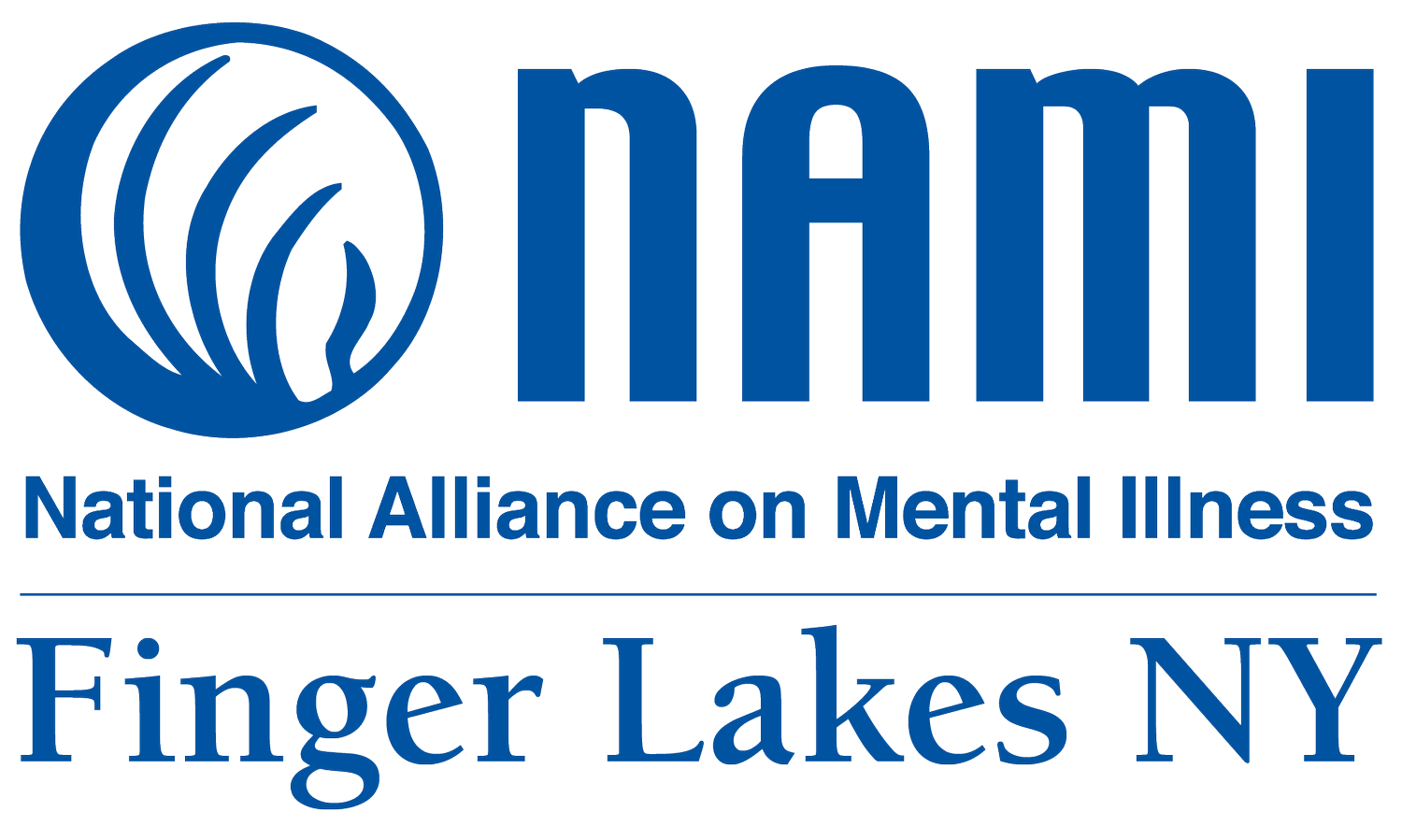
Support Groups
NAMI Finger Lakes support groups are for adults 18 and older with a loved one experiencing symptoms of a mental health condition. They are facilitated by trained individuals who are family members of people with mental health conditions.
We offer a casual environment where you can learn about local resources and gain insight from hearing the challenges and successes of others. Groups follow a structured model to ensure you and others have an opportunity to be heard and to get what you need out of the session.
Free of cost to participants
No specific medical therapy or treatment is endorsed
Confidential
NAMI FL currently offers the following Support Groups:
Family Support Group - for family members, caregivers and loved ones of individuals living with mental illness
Partner and Spouse Group - for individuals with a spouse or partner with a mental health diagnosis.
Psychosis Support Group - This is a support group for the caregivers of loved-ones who have experienced psychosis as a part of their mental health journey. It is our belief that psychosis comes with some very specific challenges and support needs, not all of which can necessarily be addressed by a more generalized mental health support focus.
Support Groups are held at the following times:
Family Support Group– 1st Tuesday of each month – 7:00PM-8:30PM
Family Support Group– 3rd Thursday of each month – 1:30PM-3:00PM
Partner & Spouse Group – 2nd and 4th Thursday of each month, 5th Thursday of the month when there is one - 7:00PM-8:30PM
Psychosis Support Group - 1st Thursday of each month - 2:00-3:30pm (starts in December)
Psychosis Support Group - 3rd Thursday of each month - 5:30-7:00pm
NAMI Finger Lakes Support Groups meet online via ZOOM. Registration is required.
What You’ll Gain
By sharing your experiences in a safe setting, you can gain hope and develop supportive relationships. This group allows your voice to be heard and provides an opportunity for your personal needs to be met. It encourages empathy, productive discussion and a sense of community. You'll benefit from other’s experiences, discover your inner strength and empower yourself by sharing your own experiences in a non-judgmental space.
NAMI Support Groups will help you:
Aim for better coping skills
Find strength in sharing experiences
Not judge anyone’s pain
Forgive ourselves and reject guilt
Embrace humor as healthy
Accept that we cannot solve every problem
Understand that mental health conditions are no one's fault and can be traumatic experiences
NAMI Finger Lakes Support Groups will meet online via ZOOM until further notice. Registration is required.
Support Group Resources
PDF downloads are provided at the bottom of the page.
Agenda
Welcome
Group Guidelines
Principles of Support
Check-in (up to 2 min.)
Group Discussion
End on Time
Guide For Check In
Share your name and briefly describe how we can support you today.
Group Guidelines
The Group Guidelines tell us how we are going to care for each other in the group. They provide the mutual consideration, acceptance and protection that are often hard to find in the real world. We will follow these guidelines at each meeting to create the sanctuary and safe place we need.
Start and stop on time
Time limit for Check In
Absolute confidentiality
Be respectful
Be mindful of others; no monopolizing or cross talk
Keep it in the here and now
Empathize with each other’s situation
Principles of Support
The Principles of Support represent what we are striving for as we struggle to come to terms with mental illness. This is our belief system regarding universal, necessary truths that guide and strengthen us when life deals us this particular challenge.
We will see the individual first, not the illness.
We recognize that mental illnesses are medical illnesses that may have environmental triggers.
We understand that mental illnesses are traumatic events.
We aim for better coping skills.
We find strength in sharing experiences.
We reject stigma and do not tolerate discrimination.
We won’t judge anyone’s pain as less than our own.
We forgive ourselves and reject guilt.
We embrace humor as healthy.
We accept we cannot solve all problems.
We expect a better future in a realistic way.
We will never give up hope.
Stages of Emotion Response
1.Dealing with Catastrophic Events
Crisis/Chaos/Shock
Denial: “normalizing”
Hoping Against Hope
Needs:
*Support *Comfort *Empathy for confusion
*Help finding resources *Crisis intervention
*Prognosis *Empathy for pain *NAMI
2. Learning to Cope
Anger/Guilt/Resentment
Recognition
Grief
Needs:
*Vent feelings *Keep hope *Education
*Self-care *Networking *Skill training
*Letting go *Co-op from System *NAMI
3. Moving into Advocacy
Understanding
Acceptance
Advocacy/Action
Needs:
*Activism *Restoring balance in life
*Responsiveness from System *NAMI
Zoom Etiquette
NAMI support groups are confidential. To the extent possible, please join us via Zoom while you are alone in a quiet setting. Use of headphones are recommended generally, and are required if there are others that could potentially hear the contents of the conversations. This is to protect the integrity of our confidential group setting.
Muting yourself while not speaking cuts down on background noise and generally allows everyone to be able to clearly hear those who are talking. Group facilitators may forcibly mute you if background noise in your setting is a distraction to the group.
Adjust your camera and lighting so we can see your face well.
Dress appropriately, as if we were meeting in person.
Avoid multitasking. We are here to support one another so let's show everyone respect by being attentive while we are together.
If you need to move around or step away from the camera during the group, then stop your video so it will be less of a distraction to others. Resume your video once you are back seated.
Some groups allow the "chat" feature. If your group allows this feature, we intend that this be used for sharing resources, and not to have side conversations in the middle of the group.
We know that we are all busy and our group may be meeting during your lunch or dinner time. However, while having a drink on hand is absolutely fine, if you need to eat while the group is taking place, please turn off your video. Or even better, if possible, eat prior to or after the group meeting time.
